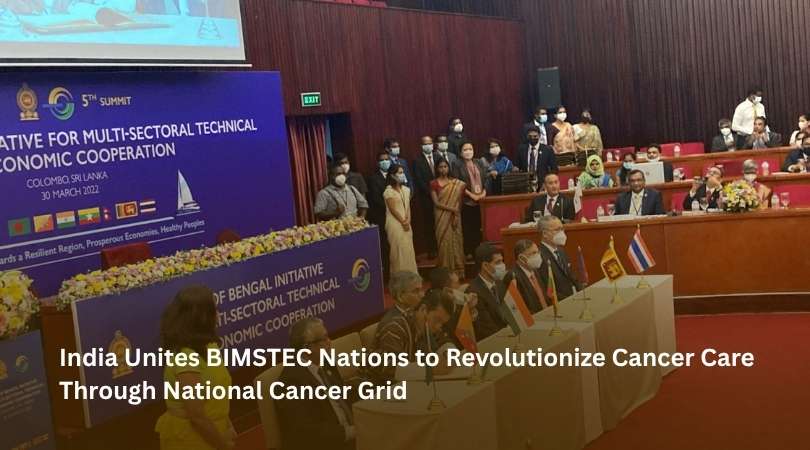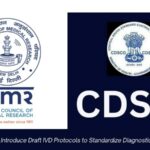6th August 2025, India
A New Chapter in Regional Oncology Cooperation
Overview
This year, BIMSTEC region stakeholders gathered in India for the NCG annual meet at Tata Memorial Hospital in Mumbai consisting of oncology specialists, government officials, public health planners, patients’ advocates and more. The event was a giant leap towards creating regional solidarity to combat cancer with nations such as Bangladesh, Bhutan, Myanmar, Nepal, Sri Lanka, and Thailand gathering alongside India for equitable and evidence-based cancer management.
For all the rich history, cultural similarity and geography that connects these nations, they have for many decades struggled against enormities in the delivery of healthcare unique to oncology. There remains room for improvement in early detection, timely access to treatment and an oncology workforce, as well as access to life-saving treatments (e.g. radiotherapy and chemotherapy). This is compounded by weak cancer research infrastructure, under-funded cancer registries and weakly developed public health policies in most of the countries to respond to the rising NCDs burden adequately.
The Mumbai summit was therefore an effort to reverse the tide by laying the cornerstone of a sustainable regional cancer control system grounded in a holistic, transnational, translational orientation. Consequently, the discussion had an institutional backbone in the form of NCG, that counts over 360 institutions from across India and beyond, served as the institutional backbone for discussions aimed at addressing these disparities through strategic cooperation.
Why This Matters
The National Cancer Grid, established in 2012, is today one of the world’s largest cancer care networks. It bridges more than 360 cancer centers, hospitals, patient groups, and medical societies in India and worldwide. Together, it sees more than 860,000 new cancer patients each year, or nearly 60% of all cancer case load in India. NCG has assisted in setting standards in oncology by encouraging quality standards, multidisciplinary care, and patient-centric practices. The BIMSTEC-specific meeting in Mumbai once more took NCG’s mission in the region, one where quality cancer care would reach all regardless of geographic or economic barriers.
The significance of the partnership is the potential that it has to democratize cancer treatment along the South and Southeast Asian area, where infrastructure and resource gaps remain to impede early diagnosis and treatment. With the cancer burden increasing in the region, the initiative could not be more important.
Key Developments & Strategic Takeaways
- BIMSTEC Cancer Care Capacity-Building Program
One of the conference achievements was the inauguration of a mega training programme organized by Tata Memorial Hospital. The trail-blazing effort greeted 21 doctors from Bangladesh, Bhutan, Myanmar, and Nepal with the aim of developing regional oncology capacity.
The first module is intensive practical training lasting four weeks in the branches of Radiation Oncology, Nuclear Medicine, and Radiology. The first module consists of four weeks of intensive practical training in Radiation Oncology, Nuclear Medicine, and Radiology. These are the areas that are most important for early detection, precise diagnosis, and timely treatment in cancer care. The program is not just designed to train the participants but also to make them ambassadors of clinical excellence in their respective countries. The planning is underway to extend this training into 12 modules on surgical oncology, pathology, palliative care, and clinical research. In investing in regional human resources, India is developing a future-capable talent pool that can enhance institutional oncology capacity in BIMSTEC nations and beyond.
- Strategic Initiatives Explored at the NCG Meeting
The yearly NCG conference explored several priority strategies to improve cancer care delivery among BIMSTEC nations. One of the most promising is implementing Virtual Tumor Boards, which allows for specialist advice and collaborative decision-making on difficult cancer cases through virtual means. This opens up access to expertise and removes the necessity for patients to travel vast distances for specialist consults.
- Affordability and Digital Transformation
Among the standout issues throughout the deliberations was making cancer care more accessible and cheaper to all. Experts advocated for practices such as pooled purchasing of cancer drugs, generic drug promotion, and open pricing practices to reduce out-of-pocket expenses.
Participants also put significant emphasis on digitalization of health as a cancer control turning point. Technologies such as AI-driven diagnostic technologies, predictive analytics, and electronic adherence monitoring systems were mentioned for their promise in amplifying quality care delivery, particularly among marginalized groups. Significantly, deliberations underlined the need for context-adjusted and equity-centered digital solutions that do not expand existing healthcare inequities.
Category | Details |
|
Event Dates | 2 and 3 August 2025 |
|
Location | Tata Memorial Hospital, Mumbai, India |
|
Participants | Experts in area, policymakers, and stakeholders from seventeen BIMSTEC and ASEAN countries |
|
Training Program | 21 participants from Bangladesh, Bhutan, Myanmar, and Nepal4-week training in Radiation Oncology, Nuclear Medicine, and RadiologyExpansion to 12 modules under consideration |
Strategic Outcomes | Implementation of Virtual Tumor BoardsDevelopment of cancer workforce and registriesTwinning of cancer centers for knowledge exchangeDiscussion on drug affordability and digital oncology solutions |
Collaboration Framework | Aligned with Gandhinagar Declaration (2023) and ASEAN–India health objectives |
To Summarize, India’s effort to host the BIMSTEC-focused National Cancer Grid meeting is a milestone in regional health diplomacy and cancer collaboration. By bringing together shared challenges under a common mission, this initiative hopes to redefine cancer care not just as a national cause but as a regional solidarity-based initiative.
The emphasis on building human capacity, ensuring equitable access, integrating innovative digital technologies, and aligning policy frameworks lays the basis for a robust and inclusive regional cancer care system. The training programme launched at the summit is not about clinical competency alone it is an investment in trust, cooperation, and action for the long term.
If instituted successfully, this model can transform the way oncology is addressed by resource-poor countries in the region. The success of all that will hinge on ongoing political will, ongoing funding, vigorous monitoring, and strong community involvement. Finally, India’s NCG-led endeavour under the BIMSTEC umbrella presents a template for global cooperation in non-communicable disease management, so that no life is lost through the unavailability of timely care, skill, or access.










